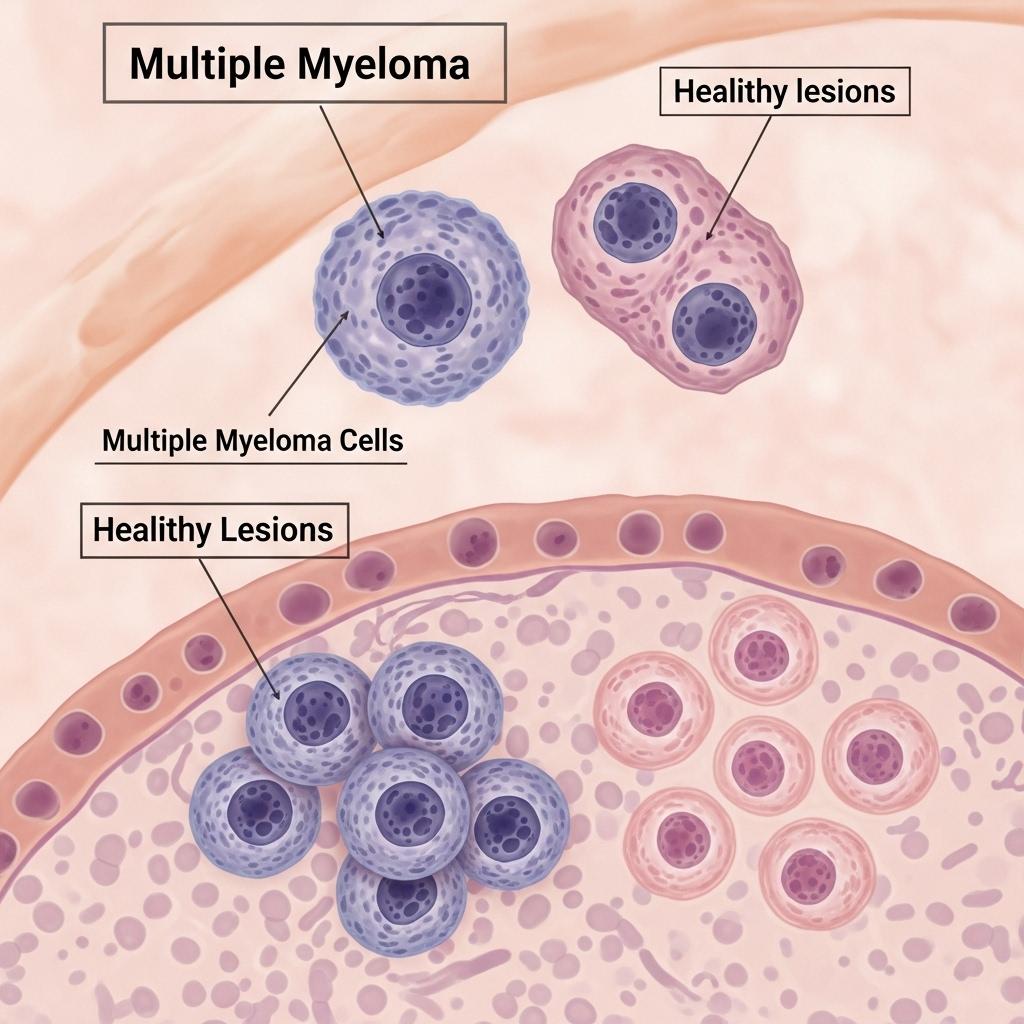Managing Multiple Myeloma: From M*** to Modern Immunotherapy

Multiple Myeloma (MM) is a hematologic malignancy arising from abnormal clonal proliferation of plasma cells in the bone marrow. These malignant cells produce monoclonal immunoglobulin (M-protein), leading to end-organ damage, including bone destruction, renal impairment, anemia, and hypercalcemia. While MM remains incurable, recent therapeutic advances have significantly prolonged survival and transformed the treatment paradigm.
Request a sample copy of the CI report at:
https://www.datamintelligence.com/strategic-insights/ci/multiple-myeloma-mm
Pathophysiology and Clinical Features
MM begins as monoclonal gammopathy of undetermined significance (M***) and can progress through smoldering myeloma to symptomatic disease. Malignant plasma cells disrupt normal hematopoiesis and secrete excess immunoglobulin or light chains, causing systemic complications.
Common signs and symptoms include:
1. Bone pain, especially in the spine or ribs
2. Recurrent infections
3. Anemia and fatigue
4. Hypercalcemia-related symptoms (e.g., confusion, constipation)
5. Renal dysfunction
6. Lytic bone lesions on imaging
Diagnosis is established through bone marrow biopsy, serum/urine protein electrophoresis, free light chain ***ysis, and advanced imaging (MRI or PET-CT).
Diagnostic Criteria and Risk Stratification
The International Myeloma Working Group (IMWG) criteria for diagnosis include:
Clonal bone marrow plasma cells ≥10% or biopsy-proven plasmacytoma
Presence of CRAB features (hypercalcemia, Renal insufficiency, Anemia, Bone lesions) or biomarkers such as:
* ≥60% clonal plasma cells in bone marrow
* Serum involved/uninvolved free light chain ratio ≥100
* 1 focal lesion on MRI
Risk is stratified based on cytogenetics, staging (ISS/R-ISS), and molecular features. High-risk cytogenetic abnormalities (e.g., del(17p), t(4;14), t(14;16)) guide treatment intensity.
Current Therapeutic Strategies
Treatment is tailored to transplant eligibility, cytogenetic risk, and patient comorbidities.
1. Induction Therapy
Common triplet regimens include bortezomib-lenalidomide-dexamethasone (VRd) or carfilzomib-based regimens.
Quadruplet regimens with daratumumab (anti-CD38 monoclonal antibody) are now preferred for fit, newly diagnosed patients.
2. Autologous Stem Cell Transplant (ASCT)
Standard of care for eligible patients after induction.
Improves depth of response and progression-free survival.
3. Maintenance Therapy
Lenalidomide is commonly used post-ASCT to prolong remission.
4. Relapsed/Refractory MM
Options include immunomodulatory ***s (IMiDs), proteasome inhibitors, monoclonal antibodies, and selinexor.
Advanced relapsed cases may receive CAR-T cell therapy or bispecific T-cell engagers (BiTEs).
Novel and Emerging Therapies
Breakthroughs in MM are reshaping long-term management:
1. CAR-T therapies targeting BCMA (e.g., ide-cel, cilta-cel) show durable responses in heavily pre-treated patients.
2. Bispecific antibodies (e.g., teclistamab) offer off-the-shelf alternatives to CAR-T.
CELMoDs (next-generation immunomodulators) and GPRC5D-targeted therapies are under investigation.
3. Genomic profiling and minimal residual disease (MRD) testing are being incorporated into clinical decision-making.
Real-World Challenges and Global Access
Despite therapeutic progress, MM care faces barriers:
* Limited access to transplant and novel agents in low-resource settings
* Financial toxicity of long-term therapy
* Management of frail or elderly patients with comorbidities
* Need for early diagnosis during M*** or smoldering phases
* Enhanced screening protocols, patient education, and equitable *** access are key to improving global outcomes.
Request a CI consultation at:
https://www.datamintelligence.com/strategic-insights/ci/multiple-myeloma-mm
Living with Multiple Myeloma
Chronic management includes:
* Monitoring for disease progression and treatment side effects
Preventing bone complications with bisphosphonates
Managing infections, neuropathy, and thrombosis
Psychological support and survivorship planning
Interdisciplinary care involving hematologists, nephrologists, orthopedic specialists, and primary care providers is essential for comprehensive care.
About DataM Intelligence
DataM Intelligence 4Market Research LLP delivers real-time competitive intelligence across autoimmune, immunologic, oncology, and rare disease spaces. Our insights span clinical pipelines, regulatory benchmarks, and commercialization strategies for stakeholders in global life sciences.
🔗 Visit: www.datamintelligence.com
- Art
- Causes
- Crafts
- Dance
- Drinks
- Film
- Fitness
- Food
- Jeux
- Gardening
- Health
- Domicile
- Literature
- Music
- Networking
- Autre
- Party
- Religion
- Shopping
- Sports
- Theater
- Wellness


